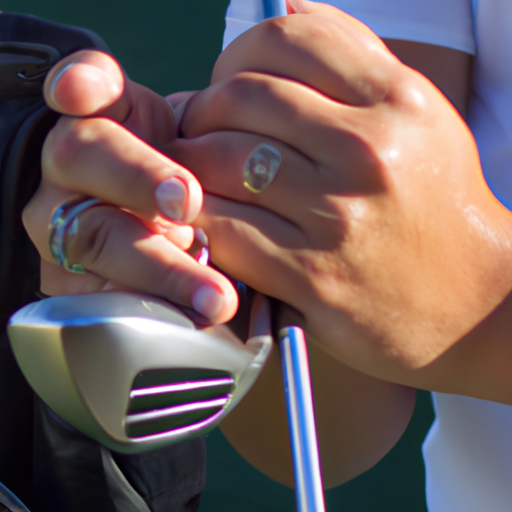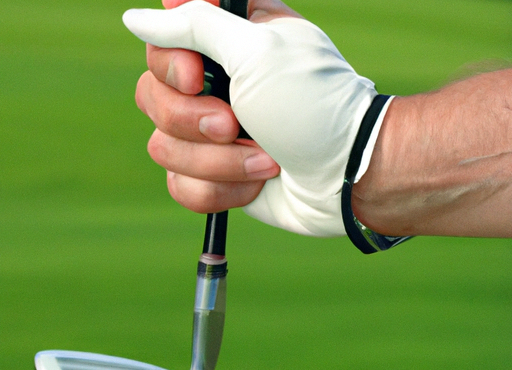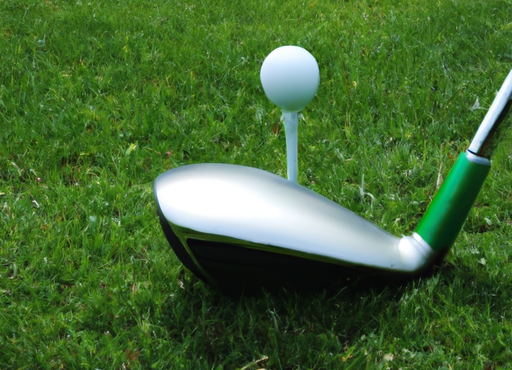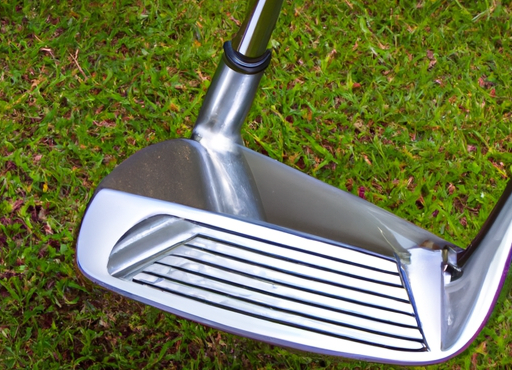
How Can I Better Handle First Tee Nerves?
Imagine stepping up to the first tee, feeling the weight of the golf club in your hands, and the adrenaline coursing through your veins. We’ve all been there – those nerves that threaten to derail our performance right from the start. But fear not, because in this article, we’ll explore some practical tips and strategies to help you better handle those first tee nerves. So, take a deep breath, relax, and read on to discover how you can conquer those jitters and start your round with confidence.
Understanding First Tee Nerves
Why do first tee nerves occur?
First tee nerves are a common experience among golfers of all skill levels. They occur due to a combination of factors, including the pressure to perform well in front of others, the fear of making a mistake or embarrassing oneself, and the anticipation of the unknown. The first tee is often seen as the starting point of a round, where the golfer’s skills and abilities are put on display for everyone to see. This can create feelings of anxiety and nervousness, affecting both physical and mental performance on the first shot.
The impact of first tee nerves on performance
First tee nerves can have a significant impact on a golfer’s performance. When experiencing nerves, the body releases stress hormones such as adrenaline, which can lead to increased heart rate, rapid breathing, and muscle tension. These physical responses can negatively affect coordination, balance, and swing mechanics, resulting in poor shots and decreased confidence. Additionally, first tee nerves can impair mental focus and concentration, making it difficult for golfers to make sound decisions and execute their shots effectively.
Common symptoms of first tee nerves
There are several common symptoms associated with first tee nerves. These may include a racing heart, sweaty palms, shaky hands, butterflies in the stomach, dry mouth, difficulty breathing, and even a feeling of dizziness or lightheadedness. Some golfers may also experience a loss of appetite or trouble sleeping the night before a round due to anxiety and nervousness. These physical and psychological symptoms can vary in intensity from golfer to golfer but are often a result of the body’s natural response to stress and anticipation.
Preparation and Mental Strategies
Physical warm-up routines
Engaging in a physical warm-up routine before stepping onto the first tee can help reduce first tee nerves. This routine may include light stretching exercises to loosen up muscles, dynamic movements such as arm circles and hip rotations, and hitting a few practice shots at the driving range or on the practice green. By getting the blood flowing and warming up muscles, golfers can alleviate some of the physical tension associated with nerves and feel more prepared physically for the upcoming round.
Mental visualization techniques
Visualization is a powerful tool for managing first tee nerves. Before teeing off, take a moment to close your eyes and mentally picture yourself hitting a successful shot down the fairway. Visualize the entire process, from setting up to the swing itself, and imagine the feeling of confidence and satisfaction that comes with a well-executed shot. This technique helps to create a positive mental image and instills a sense of belief in your abilities, reducing anxiety and increasing self-assurance.
Breathing exercises
Practicing deep breathing exercises can help calm first tee nerves and promote relaxation. Focus on taking slow, deep breaths in through the nose and out through the mouth, allowing the breath to fill your lungs and abdomen. As you inhale, envision yourself inhaling calmness and confidence, and as you exhale, release any tension or negative thoughts. Deep breathing not only helps regulate heart rate and reduce muscle tension but also allows you to center your mind and find a sense of calm amidst the nerves.
Building Confidence
Setting realistic expectations
Setting realistic expectations is crucial when it comes to handling first tee nerves. Understand that every golfer, regardless of skill level, experiences nerves to some degree. Rather than expecting perfection, focus on realistic goals and outcomes for your round. Aim to enjoy the experience, focus on process goals (such as making solid contact or staying in the present moment), and acknowledge that mistakes are a natural part of the game. By setting achievable expectations, you can alleviate the pressure on yourself and approach the first tee with a more positive mindset.
Focusing on past successes
When nerves arise before stepping onto the first tee, remind yourself of your past successes and accomplishments as a golfer. Reflect on moments when you performed well under pressure or hit great shots in similar situations. These positive memories can boost your confidence, remind you of your capabilities, and provide reassurance that you have what it takes to navigate the first tee with composure. Drawing upon past successes can help shift your focus from anxiety to a more confident and optimistic mindset.
Positive self-talk
Engaging in positive self-talk is an effective way to combat first tee nerves. Monitor your inner dialogue and replace any negative or self-doubting thoughts with positive and affirming statements. Encourage yourself with statements like “I’m prepared and capable,” “I’ve practiced this shot countless times,” or “I trust my abilities.” By consciously focusing on positive self-talk, you can reframe your mindset and boost your confidence, helping to quiet first tee nerves and promote a more relaxed state before your first shot.
Developing a Pre-Shot Routine
Creating a consistent pre-shot routine
A consistent pre-shot routine is essential for managing first tee nerves. Develop a sequence of actions that you perform before each shot to establish a sense of familiarity and routine. This routine may include elements such as visualizing the shot, taking a practice swing, checking alignment, and selecting a target. By following a consistent pre-shot routine, you create a structured process that helps channel your focus away from nerves and toward the task at hand. This routine can also serve as a trigger for confidence and a reminder of your preparation.
Reducing anxiety through repetition
Repetition is key to reducing anxiety associated with first tee nerves. Practice your pre-shot routine repeatedly during practice sessions and casual rounds to familiarize yourself with the process. By practicing the routine consistently, it becomes second nature, requiring less conscious thought on the first tee. The more you repeat and integrate your routine into your golfing habits, the more it can serve as a calming influence, alleviating nerves and promoting a smoother transition into the first shot of a round.
Incorporating visualization and relaxation techniques
Integrating visualization and relaxation techniques into your pre-shot routine can be highly beneficial for managing first tee nerves. Before addressing the ball, take a moment to visualize the shot you want to execute, seeing the ball soaring through the air and landing in your intended target. Alongside visualization, incorporate relaxation techniques such as deep breathing or a quick calming mantra to release tension and promote a feeling of focus and calmness. By combining these elements, you create a mental and physical state that supports optimal performance on the first tee.
Managing Pressure
Recognizing the difference between pressure and nerves
It is important to differentiate between pressure and nerves when managing the first tee experience. Pressure arises from external sources, such as the desire to impress others, perform well in competition, or meet certain expectations. Nerves, on the other hand, are the internal physiological and psychological responses to pressure. By recognizing that pressure is an inherent part of golf and understanding that nerves are a natural response, you can reframe your perspective and view them as indicators of excitement rather than something to fear. Shifting your mindset can help you embrace the challenge and perform better under pressure.
Putting the outcome in perspective
When experiencing first tee nerves, it can be helpful to put the outcome into perspective. Remind yourself that one shot does not define your entire round or your skills as a golfer. Golf is a game that encompasses multiple shots and holes, and it is possible to recover from a challenging start. Focus on the process, the enjoyment of the game, and the opportunity to learn and grow from every shot. By shifting your attention away from the outcome and onto the present moment, you can reduce the pressure and alleviate first tee nerves.
Utilizing stress-management techniques
Stress-management techniques can be valuable tools for managing first tee nerves, especially when pressure begins to build. Techniques such as progressive muscle relaxation, where you systematically tense and relax each muscle group, can help release tension in the body. Another technique is guided imagery, which involves mentally visualizing a calming and peaceful scene to reduce anxiety. Additionally, utilizing stress-management strategies outside of golf, such as yoga, meditation, or journaling, can contribute to an overall sense of calm and equanimity on the first tee.
Utilizing Distraction Techniques
Focusing on external factors
One effective distraction technique for managing first tee nerves is to shift your focus onto external factors. Instead of dwelling on your nerves or the pressure of the first tee, direct your attention to the surroundings. Observe the natural beauty of the golf course, the sound of birds chirping, or the sensation of the breeze on your skin. By immersing yourself in the present moment and external stimuli, you divert your focus away from the internal feelings of nervousness, allowing you to approach the shot with a clearer and calmer mind.
Utilizing sensory distractions
Engaging your senses with sensory distractions can also help alleviate first tee nerves. Carry a small item in your pocket, such as a smooth stone or a golf ball marker, that you can squeeze or touch as a physical grounding technique. Additionally, you can use scents to trigger positive associations and calm the mind. Applying a relaxing essential oil, such as lavender or eucalyptus, to your wrists or temples before teeing off can create a soothing sensory experience that can help reduce anxiety-inducing nerves.
Engaging in conversation
Engaging in conversation with a playing partner or caddie can be a valuable distraction technique to manage first tee nerves. Strike up a lighthearted conversation about non-golf-related topics to keep your mind engaged and divert attention away from your nerves. Share a funny story, discuss current events, or inquire about their golfing experiences. By engaging in conversation, you create a relaxed and social atmosphere that can alleviate nerves and encourage a more enjoyable and comfortable start to your round.
Seeking Professional Guidance
Working with a sports psychologist
For those who struggle with persistent first tee nerves, seeking the guidance of a sports psychologist can be incredibly beneficial. Sports psychologists specialize in helping athletes manage performance anxiety and develop mental skills for optimal performance. Through personalized sessions, a sports psychologist can assist in identifying the underlying causes of first tee nerves, providing coping strategies, and offering techniques to enhance mental resilience and confidence. Working with a professional can empower you to navigate nerves more effectively and unlock your full potential on the golf course.
Attending mental skills training
Mental skills training programs or workshops are another avenue to explore for managing first tee nerves. These programs are designed to teach golfers various mental strategies and techniques to enhance performance and manage psychological aspects of the game. Attending these sessions can provide valuable insights, practical tools, and a supportive environment for addressing and overcoming first tee nerves. Whether in a group or one-on-one setting, mental skills training offers structured and strategic approaches to developing a more resilient and confident mindset.
Utilizing biofeedback and relaxation training
Biofeedback and relaxation training can be useful tools for managing first tee nerves. Biofeedback technology allows individuals to monitor physiological responses to stress and anxiety, such as heart rate variability, muscle tension, and skin temperature. Through guided training sessions, you can learn to control and regulate these bodily functions, increasing self-awareness and the ability to manage nerves effectively. Combined with relaxation techniques, such as guided meditation or progressive muscle relaxation, biofeedback can provide valuable feedback and promote a calm and focused state of mind on the first tee.
Gaining Experience and Exposure
Participating in practice rounds
Participating in practice rounds can contribute to gaining experience and exposure, thus helping to manage first tee nerves. Practice rounds allow you to become familiar with the golf course, the specific challenges it presents, and the shots required on each hole. This familiarity can help reduce anxiety and build confidence leading up to the first tee shot. Additionally, practice rounds provide an opportunity to simulate tournament or competitive conditions, helping you acclimate to the pressure and better handle nerves during actual rounds.
Competing in low-stakes tournaments
Competing in low-stakes tournaments can be an excellent way to gain experience and expose yourself to competitive environments. These tournaments, such as local club events or charity outings, offer a lower-pressure setting compared to high-profile competitions. By participating in these events, you can practice managing first tee nerves in a supportive and less intense atmosphere. Over time, as you accumulate tournament experience, your confidence can grow, and you can approach the first tee with a greater sense of ease and familiarity.
Taking advantage of casual golf outings
Participating in casual golf outings with friends or family members is an enjoyable and relaxed way to gain experience and build comfort on the first tee. These outings provide a stress-free environment where the focus is more on having fun and enjoying the company of others rather than on competitive performance. By regularly engaging in these outings, you can cultivate a positive relationship with the first tee, gradually reducing nerves and allowing yourself to approach each shot with more ease and enjoyment.
Support Network
Seeking support from fellow golfers
Building a support network of fellow golfers can be immensely helpful in managing first tee nerves. Connect with other golfers who have experienced similar nerves or have successfully overcome them. Share your experiences, fears, and concerns with trusted individuals who can provide empathy, understanding, and guidance. Surrounding yourself with supportive and encouraging individuals can boost your confidence, provide perspective, and remind you that you are not alone in your journey to manage first tee nerves. A strong support network can provide the motivation and reassurance needed to face every round with more composure and resilience.
Building a strong relationship with a caddie
For golfers who enlist the help of a caddie, building a strong relationship and open line of communication can be advantageous in managing first tee nerves. A caddie can offer reassurance, encouragement, and practical advice throughout the round. Discuss your apprehensions and concerns with your caddie beforehand, ensuring they understand your goals and any specific triggers that may exacerbate nerves. A supportive and knowledgeable caddie can provide a calming presence and help you approach the first tee with confidence and composure.
Involving family and friends for encouragement
Involving family and friends in your golfing journey is another way to seek support and encouragement when dealing with first tee nerves. Share your experiences and feelings with loved ones who can offer continuous support and motivation. Invite family and friends to attend your rounds or accompany you during practice sessions, creating a positive and supportive environment. Their presence, cheers, and words of encouragement can help ease nerves and foster a sense of confidence and belonging on the first tee.
Maintaining a Healthy Lifestyle
Ensuring sufficient rest and sleep
Maintaining a healthy lifestyle that includes sufficient rest and sleep is crucial in managing first tee nerves. Lack of sleep and fatigue can amplify feelings of anxiety and stress, making it more challenging to cope with nerves effectively. Prioritize getting an adequate amount of sleep each night, ensuring that your body and mind are well-rested for the demands of golf. Establishing a consistent sleep routine and creating a relaxing pre-sleep routine can contribute to better sleep quality, helping you approach each round with a refreshed and energized mindset.
Eating well-balanced meals
Proper nutrition plays a significant role in managing first tee nerves and overall performance on the golf course. Consuming well-balanced meals that include a combination of lean proteins, whole grains, fruits, and vegetables can provide the necessary nutrients and energy needed to maintain focus and calmness. Avoid consuming heavy or sugary foods before a round, as they can lead to energy crashes and potential gastrointestinal discomfort. Instead, opt for lighter, easily digestible meals that can sustain energy levels and support mental and physical well-being.
Incorporating regular exercise
Regular exercise is a valuable component in managing first tee nerves. Engaging in physical activity, such as walking, jogging, or participating in other sports, helps reduce stress and anxiety by releasing endorphins, improving mood, and increasing overall resilience. Additionally, regular exercise can enhance cardiovascular health, coordination, and flexibility, all of which contribute to improved golf performance. Find activities that you enjoy and incorporate them into your routine to promote physical and mental well-being, ultimately supporting your efforts to handle first tee nerves more effectively.
In conclusion, first tee nerves are a common experience for golfers, but they can be managed effectively through proper preparation, mental strategies, confidence-building techniques, developing a pre-shot routine, managing pressure, utilizing distraction techniques, seeking professional guidance, gaining experience and exposure, building a support network, and maintaining a healthy lifestyle. By implementing these strategies and approaches, you can approach the first tee with confidence, calmness, and enjoyment, setting the stage for a successful round of golf. Remember, managing first tee nerves is a continuous process that requires practice, patience, and an open mindset. Embrace the challenge, believe in yourself, and trust in your abilities as you navigate the wonderful world of golf.



